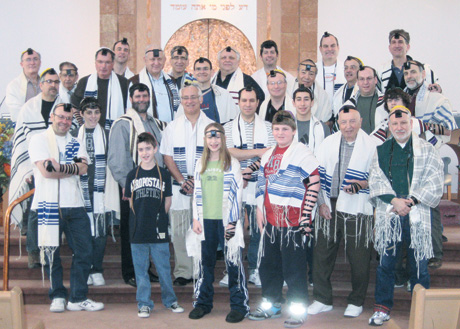World Wide Wrap Welcomes Worshippers

Fans of the Pittsburgh Steelers and the Green Bay Packers won’t be the only ones praying on Superbowl Sunday.
Across New Jersey, the United States, and the world, men, women, and children will gather to participate in a morning minyan, or morning prayer service. But many of those who gather on this particular Sunday will perform an ancient ritual for the first, or the only, time this year.
The Federation of Jewish Men’s Clubs, which oversees men’s clubs at Conservative synagogues around the world, has once again organized the World Wide Wrap. Scheduled for Sunday, Feb. 6, the 11th World Wide Wrap is an international, coordinated minyan encouraging Jews to participate in one of the basic mitzvot, or commandments, in the Torah: the wrapping of tefillin. Synagogues, prayer groups, and individuals can register to participate at www.worldwidewrap.org. The site records numbers of participants and their locations around the world. Administrators post pictures of synagogue members and other groups praying with tefillin as the pictures come in from Jewish communities in locations ranging from Australia to India to the United States.
As of Tuesday, close to 10,000 people have signed up and organizers are hoping for thousands more.
“Twelve years ago we learned many people didn’t have the tradition of wearing tefillin at morning services,” said Stan Greenspan, FJMC vice president of programming. “It seemed tefillin was the mitzvah some people were forgetting. It’s an important ritual and important prayer.”
In response to the FJMC’s discussions on the subject, Temple Israel, a conservative synagogue in Charlotte, N.C. organized a gathering of 100 men to wrap tefillin and pray together. That event provided the inspiration for the national program that became the World Wide Wrap, according to Greenspan.
The goal is not to have people don tefillin only on Superbowl Sunday, but on every weekday during the year. The WWW is meant to educate and inspire participants, not limit them to one day of observance.
Some local congregations have been regular participants and are gearing up to participate again. Eric Weis, past president of the New Jersey region of FJMC, stressed its desire to demystify the rite. Weis is a member of Cong. Shomrei Torah in Wayne and of Temple Israel Community Center/Cong. Heichal Yisrael in Cliffside Park, both of which are participating on Sunday. (The Wayne congregation expects 40 people at its event.)
“The event is designed to make it a communal and enjoyable practice, not one that is esoteric, because many people look at this rite as strange and unsettling,” he said.
The ritual consists of wrapping straps around one’s arm and head to hold in place written biblical texts, including the Sh’ma: “Hear O Israel the Lord is our God, the Lord is One” — because it contains the commandment to wear tefillin. The texts, handwritten on special parchment by a qualified scribe, are housed in small leather boxes, held in place against the head by the leather straps.
While in some communities wrapping tefillin is an activity for men only, women participate in the World Wide Wrap, according to Weis.
“I’m told and I believe women did this in biblical times, and it’s not a matter of Torah but of custom that some men say, ‘It is ours,’” he said. “We do welcome women’s participation in the ritual.”
In fact, the Babylonian Talmud tractate Eruvin 96a-b informs us that Michal, the daughter of King Saul and first wife of King David, wore tefillin without objection from the sages of her day.
The FJMC chose Superbowl Sunday as the date for the event each year because it believed that date would help to bring families together.
“We made a conscious choice to have it on Superbowl Sunday, the second biggest family day after Thanksgiving in the U.S.,” said Greenspan. “People are in their homes and do not travel that day.”
For many Jews, including Weis, putting on tefillin is a conduit to greater spiritual connection.
“You are living those words,” Weis said. “You are binding yourself to God, loving God with all your heart by wrapping tefillin around your arm, with all your mind by putting the words to your head, with all your might by wrapping yourself really tightly.”
For him, the practice is also about continuity.
“My grandfather, when I was 13, did this with me,” Weis said. “He took me to his synagogue in Passaic.… I can’t remember many things about my grandfather, but I remember the joy he had, doing this. It’s all wrapped up — no pun intended — in carrying on what my grandfather and great-grandfather were doing.”
This entry was written by Heather Robinson and posted on February 5, 2011 at 5:41 pm and filed under Features. permalink. Follow any comments here with the RSS feed for this post. Keywords: . Post a comment or leave a trackback: Trackback URL. */?>




